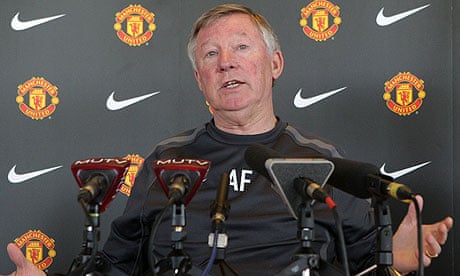Sir Alex Ferguson has lashed out at the Football Association for its two-match ban on Wayne Rooney for swearing, claiming it is "obvious" Manchester United are being victimised. In addition the manager criticised Lee Mason, the referee in the 4-2 win over West Ham United last Saturday, saying: "I don't know how his career is going to go now."
Ferguson also delivered an extraordinary tirade against Superintendent Mark Payne of the West Midlands police, who had said on his blog that Rooney's behaviour set a bad example to young people. Payne, based in Wolverhampton, wrote that Rooney's "aggressive stance", and "foul-mouthed rant" when celebrating his hat-trick at Upton Park would mean: "My officers will face more Rooneys over the weekend, no doubt somebody will be injured in some meaningless fight. An officer will have to go and tell a parent that their son or daughter is in hospital as a result." The superintendent claimed that he "would have expected my officers to lock him up" had Rooney behaved like that on a Saturday night.
Ferguson would not respond to Payne's broader point that high-profile players have responsibilities as role models, but scorned the expectation that people would be arrested for swearing. "I refuse to believe that in the middle of Wolverhampton on a Saturday night his police don't get abuse and that people are arrested," Ferguson said. "I'm sure of that."
The United manager called Payne "a wee guy, sitting down in the Midlands, probably never been recognised in his life", who had "managed to elevate himself to whatever it is in the police force". He accused the officer of attention seeking.
"Some people feel the need to be noticed; maybe people don't know he's there," he added. "You see nowadays, with people wearing tattoos and earrings, it's a need-to-be-noticed world we're in."
Asked if he believed the two-match ban imposed by the FA, which found Rooney had breached the prohibition on using "insulting, abusive or threatening language", was fair, Ferguson said: "I don't know if you can use that word 'fair' any longer." The Scot received a five-match touchline ban from the FA after complaining about Martin Atkinson's handling of United's 2-1 defeat at Chelsea, saying: "You want a fair referee."
He said it is "an obvious trend" that United are being victimised by the FA. The governing body declined to respond to that allegation.
Referring to Mason, who told the FA after the match that had he seen Rooney swearing at the camera he would have sent him off, Ferguson said he felt sorry for the official. "He was put under pressure [by the FA], there is no doubt about that. He's now put himself in the spotlight and if he doesn't send a player off for swearing the question will be: has he got double standards? It's a very difficult position. I don't know how his career is going to go now."
Ferguson said the episode, which Gary Neville also criticised as "a harsh, dangerous precedent", would bring his players together, and make them more "united," for Saturday's match against Fulham and Tuesday's Champions League quarter-final second leg against Chelsea.
The West Midlands police force declined to respond to Ferguson's attack on Supt Payne, but did issue a clarification of the law on swearing. The force said that people are "most likely" to be arrested where they use "insulting, abusive or threatening words connected to aggression or violence, or where we receive a specific complaint from a member of the public."
